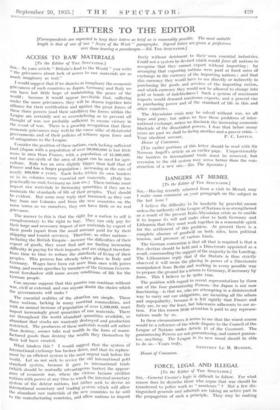DANGERS AT MEMEL
[To the Editor of TUE SPECTATOR.] Sin,—Having recently returned from a visit to Memel, may I make some comment on your paragraph on the subject in the last issue ? I believe the difficulty to be insoluble by peaceful, means unless the authority of the League of Nations is so strengthened as a result of the present Italo-Abyssinian crisis as to enable it to impose its will and make clear to both Germany and Lithuania that they must work together in a reasonable spirit for the settlement of this problem. At present there is a complete absence of goodwill on both sides, keen political tension, and pressure of various kinds. The German contention is that all that is required is that a free election should be held and a Directorate appointed as a result, commanding the support of the majority in the Landlag. The Lithuanians reply that if the Statute of a roo e ois thus strictly observed it will mean the placing in power manipulated from Berlin and working in every possible way to prepare the ground for a return to Germany, if necessary by force. This I believe to be quite true.
The position with regard to recent representations by three Powers—forre out of the four guaranteehino a gattempting o a disinterested J iap an not now functioning—is that we, w way to carry out our obligations, are incurring all the odium and unpopularity, because it is felt rightly that France and Italy are, to say the least, but lukewarm adherents to our ac- tion. For this reason little attention is paid to any represen- tations made by us.
In these circumstances it seems to me that the wisest course would be a reference of the whole dispute to the Council of the League of Nations under Article 11 of the Covenant. The guaranteeing Powers are not guaranteeing, and cannot guaran- tee, anything. The League in its new mood should be able to do so.—Yours truly,
House of Commons.
GEOFFREY LE • M. MANDEB..






































 Previous page
Previous page